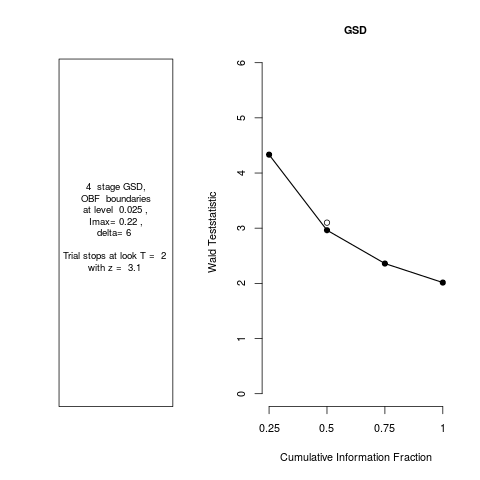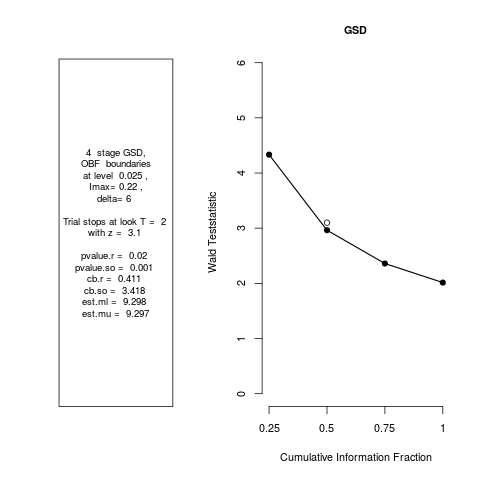Supported by Dr. Osamu Ogasawara and  providing providing  . . |
|
Last data update: 2014.03.03 |
Group sequential trial object (GSTobj)DescriptionThe Usage
GSTobj(x, ...)
## S3 method for class 'GSTobj'
plot(x, main = "GSD", print.pdf = FALSE, ...)
## S3 method for class 'GSTobj'
print(x, ...)
## S3 method for class 'GSTobj'
summary(object, ctype = c("r", "so"), ptype = c("r", "so"),
etype = c("ml", "mu", "cons"), overwrite = FALSE, ...)
## S3 method for class 'summary.GSTobj'
print(x, ...)
Arguments
DetailsA The function
The calculated confidence bounds are saved as:
The calculated p-values are saved as:
The calculated point estimates are saved as:
The stage-wise adjusted confidence interval and p-value and the median unbiased point estimate can only be calculated at the stage where the trial stops and is only valid if the stopping rule is met. The repeated confidence interval and repeated p-value, conservative estimate and maximum likelihood estimate can be calculated at every stage of the trial and
not just at the stage where the trial stops and is also valid if the stopping rule is not met.
For calculating the repeated confidence interval or p-value at any stage of the trial the user has to specify the outcome ValueAn object of class
Note
Author(s)Niklas Hack niklas.hack@meduniwien.ac.at and Werner Brannath werner.brannath@meduniwien.ac.at See Also
ExamplesGSD=plan.GST(K=4,SF=1,phi=0,alpha=0.025,delta=6,pow=0.8,compute.alab=TRUE,compute.als=TRUE) GST<-as.GST(GSD=GSD,GSDo=list(T=2, z=3.1)) GST plot(GST) GST<-summary(GST) plot(GST) ##The repeated confidence interval, p-value and maximum likelihood estimate ##at the earlier stage T=1 where the trial stopping rule is not met. summary(as.GST(GSD,GSDo=list(T=1,z=0.7)),ctype="r",ptype="r",etype="ml") ## Not run: ##If e.g. the stage-wise adjusted confidence interval is calculated at this stage, ##the function returns an error message summary(as.GST(GSD,GSDo=list(T=1,z=0.7)),ctype="so",etype="mu") ## End(Not run) Results
R version 3.3.1 (2016-06-21) -- "Bug in Your Hair"
Copyright (C) 2016 The R Foundation for Statistical Computing
Platform: x86_64-pc-linux-gnu (64-bit)
R is free software and comes with ABSOLUTELY NO WARRANTY.
You are welcome to redistribute it under certain conditions.
Type 'license()' or 'licence()' for distribution details.
R is a collaborative project with many contributors.
Type 'contributors()' for more information and
'citation()' on how to cite R or R packages in publications.
Type 'demo()' for some demos, 'help()' for on-line help, or
'help.start()' for an HTML browser interface to help.
Type 'q()' to quit R.
> library(AGSDest)
> png(filename="/home/ddbj/snapshot/RGM3/R_CC/result/AGSDest/GSTobj.Rd_%03d_medium.png", width=480, height=480)
> ### Name: GSTobj
> ### Title: Group sequential trial object (GSTobj)
> ### Aliases: GSTobj plot.GSTobj print.GSTobj print.summary.GSTobj
> ### summary.GSTobj
> ### Keywords: datasets
>
> ### ** Examples
>
> GSD=plan.GST(K=4,SF=1,phi=0,alpha=0.025,delta=6,pow=0.8,compute.alab=TRUE,compute.als=TRUE)
> GST<-as.GST(GSD=GSD,GSDo=list(T=2, z=3.1))
> GST
4 stage group sequential design
alpha : 0.025 SF: 1 phi: 0 Imax: 0.22 delta: 6 cp: 0.8
Upper bounds 4.333 2.963 2.359 2.014
Lower bounds -8.000 -8.000 -8.000 -8.000
Information fraction 0.250 0.500 0.750 1.000
als 0.000 0.002 0.010 0.025
alab 10.065 3.008 0.936 0.000
group sequential design outcome:
T: 2 z: 3.1
> plot(GST)
> GST<-summary(GST)
> plot(GST)
> ##The repeated confidence interval, p-value and maximum likelihood estimate
> ##at the earlier stage T=1 where the trial stopping rule is not met.
> summary(as.GST(GSD,GSDo=list(T=1,z=0.7)),ctype="r",ptype="r",etype="ml")
repeated lower confidence bound: -15.409
repeated p-value: 0.558
maximum likelihood estimate: 2.969
4 stage group sequential design
alpha : 0.025 SF: 1 phi: 0 Imax: 0.22 delta: 6 cp: 0.8
Upper bounds 4.333 2.963 2.359 2.014
Lower bounds -8.000 -8.000 -8.000 -8.000
Information fraction 0.250 0.500 0.750 1.000
als 0.000 0.002 0.010 0.025
alab 10.065 3.008 0.936 0.000
group sequential design outcome:
T: 1 z: 0.7
> ## Not run:
> ##D ##If e.g. the stage-wise adjusted confidence interval is calculated at this stage,
> ##D ##the function returns an error message
> ##D summary(as.GST(GSD,GSDo=list(T=1,z=0.7)),ctype="so",etype="mu")
> ## End(Not run)
>
>
>
>
>
> dev.off()
null device
1
>
|



